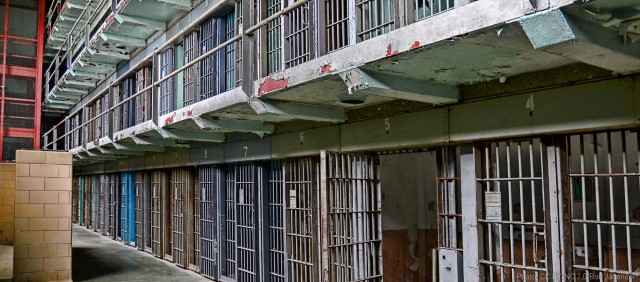Montana is examining its role in the corporate warehousing of prisoners. As the Missoulian reports, Montana lawmakers met yesterday to explore whether to purchase Crossroads Correctional Center, a privately run prison in Shelby, when the state's 20-year contract with Corrections Corporation of America (CCA) is up in 2019. Montana would do well to end its reliance on this controversial, for-profit corporation to run one of our state’s largest prisons.
Many for-profit facilities have become notorious for poor conditions and inexperienced staff – sometimes the results of cutting corners and skimping on officers’ salaries to maximize profits. Private prisons sometimes cherry pick their prisoners, leaving the most expensive for the state. Private prisons benefit from policies that imprison more people for longer periods of time. They are principally focused on making a profit, not promoting public safety. And private prisons often lack oversight and operate under different regulatory standards.
In April 2009, the ACLU of Montana brought a human rights complaint against the state of Montana, Crossroads Correctional Center and Corrections Corporation of American on behalf of Native American inmates at the Crossroads Correctional Center in Shelby whose rights were violated through en-masse strip searches, being denied the ability to properly celebrate sweat lodge ceremonies and being retaliated against when they complained about the mistreatment. The state of Montana investigated the claims and issued a report in May 2009 confirming almost all of the prisoners’ allegations.
An audit two years later in 2011 determined that Crossroads Correctional Center in Shelby was mostly in compliance. Yet, it has still seen its share of complaints from prisoners as well as previous staff.
Banking on Bondage, a 2011 report from the ACLU, details several studies suggest that prisoners in for-profit prisons face greater threats to their safety than those in publicly-run prisons. They also suggest that private prisons are more dangerous for both guards and for inmates. James Austin, a professor at George Washington University found that private prisons had 50% more inmate on staff assaults and two-thirds more inmate on inmate assaults, when institutions of similar security level were compared. Additionally, numerous religious groups – including the US Conference of Catholic Bishops, the Presbyterian Church USA, and the United Methodist Church – have condemned the perverse incentives involved in for-profit incarceration, often emphasizing the inherent conflict between the goal of rehabilitation and the company's profit motive.
As private prisons face growing opposition, many states have ended contracts or blocked these privatization schemes. In early 2012, the Florida legislature voted down a proposal to privatize nearly 30 prisons, and a committee in the Maine Legislature unanimously rejected a law designed to expand the use of private facilities. Idaho took over the Corrections Corporation of America facility in Boise in 2014 after concerns about mismanagement, safety, and regulatory issues. And Ohio declined to renew its contract with CCA for its Youngstown facility in January of 2015 due to issues of staffing and safety concerns. Ending CCA’s contract for the Shelby prison would align Montana with this positive trend.
The deprivation of physical freedom is one of the most severe interferences with liberty that the State can impose. The power to deprive people of their freedom should not be delegated to private entities motivated principally by the desire to make money rather than by human rights, citizen safety, or the public good.








